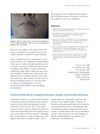 71 citations,
September 2006 in “Cell Transplantation”
71 citations,
September 2006 in “Cell Transplantation” Fetal skin cells from a cell bank heal wounds faster and with less scarring than adult cells.
 105 citations,
February 2017 in “British Journal of Dermatology”
105 citations,
February 2017 in “British Journal of Dermatology” Survivors of Stevens-Johnson syndrome/toxic epidermal necrolysis need ongoing care for various long-term health problems.
 33 citations,
April 2020 in “Journal of Clinical Investigation”
33 citations,
April 2020 in “Journal of Clinical Investigation” Stress in hair follicle stem cells causes inflammation in a chronic skin condition through a specific immune response pathway.
 79 citations,
January 2018 in “Wiley Interdisciplinary Reviews-Developmental Biology”
79 citations,
January 2018 in “Wiley Interdisciplinary Reviews-Developmental Biology” Understanding how baby skin heals without scars could help develop treatments for adults to heal wounds without leaving scars.
 January 2020 in “Archives of Medicine and Health Sciences”
January 2020 in “Archives of Medicine and Health Sciences” Certain immune molecules and stress affect hair loss, and while genes play a role, more research is needed to fully understand and treat it.
 7 citations,
September 2021 in “Anais Brasileiros De Dermatologia”
7 citations,
September 2021 in “Anais Brasileiros De Dermatologia” COVID-19 can cause temporary hair loss, often starting around 7-8 weeks after recovery, with factors like Vitamin D deficiency, other diseases, medication, and stress potentially contributing.
 7 citations,
June 2021 in “Trends in Food Science and Technology”
7 citations,
June 2021 in “Trends in Food Science and Technology” Western diet may cause male pattern baldness; low glycemic diet with magnesium could help.
 January 2021 in “Journal of Allergy and Therapy”
January 2021 in “Journal of Allergy and Therapy” Electric Follicle Stimulation may promote hair growth and density with no known side effects.
29 citations,
November 2011 in “Cell stress & chaperones” Quercetin effectively treated and prevented hair loss in mice.
 1 citations,
December 2022 in “PubMed”
1 citations,
December 2022 in “PubMed” COVID-19 may cause temporary hair loss, which usually gets better on its own, but reducing stress and managing health issues might help recovery.
 35 citations,
November 2020 in “Dermatologic Therapy”
35 citations,
November 2020 in “Dermatologic Therapy” Severe COVID-19 may cause hair loss, and doctors recommend supplements and topical treatments to manage it.
 1 citations,
January 2019 in “Turk Dermatoloji Dergisi”
1 citations,
January 2019 in “Turk Dermatoloji Dergisi” Oxidative stress is likely important in causing telogen effluvium, and antioxidants might help treat it.
 9 citations,
November 2013 in “Dermatologic Surgery”
9 citations,
November 2013 in “Dermatologic Surgery” Hair transplant complications were likely due to deep graft placement and rough handling.
April 2021 in “Libyan journal of medical sciences” A woman's hair loss improved with treatment after a COVID-19 infection.
 14 citations,
April 2014 in “International Journal of Cosmetic Science”
14 citations,
April 2014 in “International Journal of Cosmetic Science” Acne is caused by multiple factors including oil production, bacteria, inflammation, and possibly diet and environment.
 7 citations,
August 2021 in “Heliyon”
7 citations,
August 2021 in “Heliyon” Phyllotex™ extract was found to significantly promote hair growth and protect against hair loss.
 September 2022 in “JAMC. Journal of Ayub Medical College, Abbotabad, Pakistan/Journal of Ayub Medical College”
September 2022 in “JAMC. Journal of Ayub Medical College, Abbotabad, Pakistan/Journal of Ayub Medical College” A boy with a rare skin condition improved quickly after starting zinc supplements.
 6 citations,
October 1993 in “The journal of the Royal Society of Health”
6 citations,
October 1993 in “The journal of the Royal Society of Health” Children's hair loss has many causes and requires careful diagnosis and personalized treatment, including emotional support.
99 citations,
September 2007 in “The American journal of pathology” Chemotherapy damages hair follicles, causing hair loss and other cellular changes.
 19 citations,
January 2015 in “Journal of Clinical and Diagnostic Research”
19 citations,
January 2015 in “Journal of Clinical and Diagnostic Research” The main causes of diffuse hair loss in women are telogen effluvium and androgenetic alopecia, often related to stress and iron deficiency.
March 2022 in “International Journal of Trichology” Smoking may worsen hair loss, but more research is needed.
 33 citations,
October 2017 in “Drug Safety”
33 citations,
October 2017 in “Drug Safety” SJS/TEN survivors often have severe, overlooked long-term physical problems that are not properly treated after leaving the hospital.
15 citations,
January 2023 in “Antioxidants” Oxidative stress plays a significant role in alopecia areata, and new treatments may include JAK inhibitors and antioxidants.
 3 citations,
September 2005 in “Experimental dermatology”
3 citations,
September 2005 in “Experimental dermatology” The cornified envelope is crucial for skin's barrier function and involves key proteins and genetic factors.
August 2024 in “Bioorganic Chemistry” Cedrol from ginger can promote hair growth when taken orally.
October 2024 in “Our Dermatology Online” Mitochondrial dysfunction links metabolic syndrome and inflammatory skin diseases, suggesting targeted therapies and lifestyle changes.
 2 citations,
January 2014 in “Springer eBooks”
2 citations,
January 2014 in “Springer eBooks” Polycystic Ovary Syndrome (PCOS) often leads to severe acne, and lifestyle changes and hormonal treatments can help manage it.
April 2024 in “Biomolecules” Exosomal miRNAs from stem cells can help improve skin health and delay aging.
April 2024 in “Molecules/Molecules online/Molecules annual” Paris polyphylla saponins may effectively treat acne due to their antibacterial and anti-inflammatory properties.
1 citations,
December 2022 in “Pathogens” A stray cat with severe scabies recovered after 4 weeks of treatment.




















